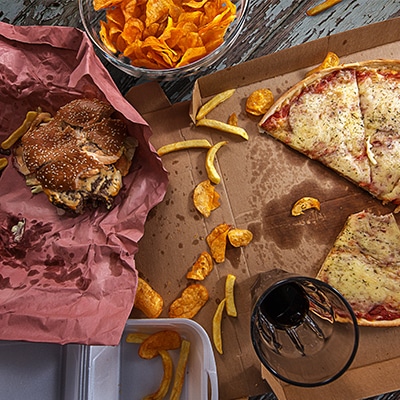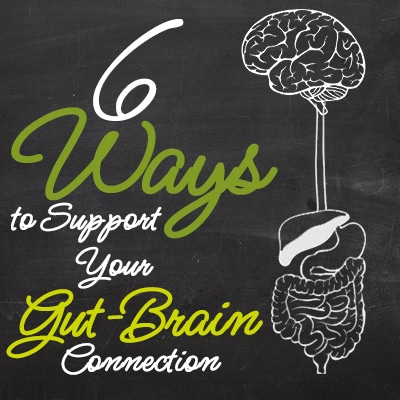Want to Be Happier? 6 Ways to Support Your Gut-Brain Connection
The science behind the gut and it’s 100 trillion organisms that live within it, is unraveling before our very eyes.
It seems each day more research indicates that the gut is more influential than we’ve ever realized before.
Some of the most fascinating gut related research has strong implications that there’s a gut-brain connection where the gut holds a powerful influence over your emotions.
At first glance it might seem crazy to attribute something like our emotions to the little microbes living in our stomach, but stop and consider for a moment all the different phrases that exist and associate the gut with emotions…
What about when something is ‘gut wrenching’…
Or when you tell someone to ‘trust their gut’…
What about when you have a ‘gut reaction’… And remember when you’d get ‘butterflies in your stomach’?
What about when you’d get so nervous you’d have a ‘knot in your stomach’…
Surely this isn’t a coincidence?
Well, believe it or not there’s tons of research indicating that your gut health directly influences your mental state and emotional well being.
The good news is this means there’s a ton you can do to improve your mental health without relying on medications.
That’s not to say some people won’t need the support of medications, but rather there’s much more we can do for our emotional well being than we ever realized before.
How Does The Gut-Brain Connection Work?
Part of your nervous system called the enteric nervous system is located within the wall your gastrointestinal tract. This huge mesh-like network of neurons has more nerve endings than your spinal cord and is also called, “the second brain.”
This is because it influences emotions, controls functions, and is involved in neurotransmitter synthesis and movement.
In fact, 95 percent of your serotonin – what’s often called your ‘happy neurotransmitter’ – is found in your gastrointestinal tract. You know when you become nervous or scared and you feel the gut reaction of the fight-or-flight response in your body?
That’s your gut-brain connection at work. This is also why stress is so damaging to your overall health.
When you’re under chronic stress it can cause gastrointestinal disorders.
We’ve all struggled with difficult times in our lives, but when it becomes depression or anxiety this powerful gut-brain connection suggests it’s a good idea to look for solutions in the gut.
Signs Your Emotional State is Impacted by Your Gut Health
If you experience a combination of emotional symptoms and physical symptoms, your problems could be due to the gut-brain connection.
Emotional symptoms:
 Mood swings
Mood swings- Depression
- Anxiety
- Insomnia
- Nervousness
- Feeling overwhelmed
- Eating or drinking for comfort
- Social withdrawal
Physical symptoms:
- Digestion issues
- Restlessness
- Brain fog
- Tense shoulders or neck
- Sugar cravings
- Headaches
- Fatigue
- Unexplained weight loss or gain
The good news is when you know the power your gut health has over your emotional well being there are a lot of relatively easy changes you can make to get your life back on track.
7 Ways to Support Your Gut-Brain Connection
Everyone is completely different and this helpful list is by no means a cure or treatment for any condition.
Instead, it’s a collection of suggestions that could help your gut health and therefore positively impact your day-to-day feelings.
- Eat fermented foods – These add the helpful bacteria back into your gut. Especially, foods containing Lactobacillus rhamnosus, which has been shown to help regulate emotions through the gut-brain connection.
- Reduce sugar intake – Sugar has a tendency to feed the harmful bacteria in your gut. Also, sugar can set of the cycle of sugar cravings and be a hard cycle to break. When you eat less sugar and replace it with more healthy fats and protein, you help your gut-brain connection.
- Eat a diverse diet – Diversity in the microbiome is the best characteristic in good gut health. To have a diverse microbiome, you need to eat a variety of foods because each item feeds different species of bacteria.
- Eat healthy fats – Healthy fats support both good gut health and good brain health. Incorporate things like coconut oil, olive oil, avocado, nuts, seeds, and wild caught fish. Omega-3s found in many of these oils have even been shown to help patients struggling with depression in many studies.
- Make sure you aren’t eating foods you’re sensitive or allergic to – A lot of people have sensitivities to various foods that aren’t strong enough to cause a complete allergic reaction. Instead, they are stuck dealing with low grade inflammation and chronic digestive issues. Make sure you aren’t dealing with a sensitivity by having a simple test done with your doctor. Some of the most common food sensitivities include gluten, dairy, eggs, peanuts, tree nuts, shellfish, and foods high in histamine.
- Atrantil – Atrantil is a botanical treatment for bloating and digestive issues. If you’re struggling with chronic gastrointestinal issues, Atrantil may be able to help. Atrantil works through a three step process to stop gas producing bacteria from causing your bloating. Peppermint leaf, quebracho, and horse chestnut work together to interrupt harmful bacteria, get them to go back into the colon where they belong, and offer you relief.
Happiness Can Start in the Gut
The gut-brain connection is powerful. Try the helpful steps above to improve your gut health and reap the benefits a strong gut can have on your brain.
Take good care of your gut – the rest of your health depends on it.

Very good article!
Gud article
Hi Lata,
Thank you for your feedback. We are glad you like our article! Be sure to check out all of our blogs at http://www.atrantil.ca/blogs/.
Best wishes,
Team Atrantil
I have been taking for 60 days. I took a test and I am deficient in specific bacteria. Can I take this with a probiotic. I have been doing it and noticed some relief though I am not yet normal. My probiotic says 3 months before I will improve.
Hi Jon,
Thank you for your question! We do not recommend taking probiotics while taking Atrantil, unless they are spore based. The reason we do not recommend other kinds of probiotics is because Atrantil works to get rid of the overgrowth of bacteria in the small bowel, which causes the adverse symptoms.
By adding in more bacteria through probiotics, you are adding more fuel to the fire by putting more bacteria in the area we are trying to get rid of it. However, once Atrantil has had a chance to work and the small bowel is able to flow freely again, so that the bacteria flow into the colon where they belong, you can add back in the probiotics.
If you do choose to take probiotics while on Atrantil, just know it may take longer to see results. And in that case, we recommend spacing them at least an hour apart from the time you take Atrantil.
Thank you and best wishes,
Team Atrantil
I took for 60 days with improvement, but I was still sick. Started probiotic with maintenance dose. I am amazed how sick I still am. Also taking an enzyme with every meal. Any thoughts are appreciated. Everything I read says take a probiotic for bloating which is my main problem.
Hi Jon,
We are glad that you did have improvement while on Atrantil, but we are sorry that you are not feeling well now.
We do not recommend taking probiotics while taking Atrantil unless they are spore-based. The reason we do not recommend other kinds of probiotics in because Atrantil works to get rid of the overgrowth of bacteria in the small bowel, which causes adverse symptoms.
By adding in more bacteria through probiotics, you are adding more fuel to the fire by putting more bacteria in the area we are trying to get rid of it. However, once Atrantil has had a chance to work and the small bowel is able to flow freely again so that the bacteria flow into the colon where they belong, you can add back in the probiotics.
You may have added the probiotics back in too soon before your bacterial overgrowth was completely cleared up.
We recommend continuing on 2 capsules 3 times per day until symptoms have been completely relieved. Once your symptoms have been relieved, then you can slowly add back in the probiotics.
We hope this helps to clarify. Please let us know if we can be of further assistance.
Thank you and best wishes,
Team Atrantil